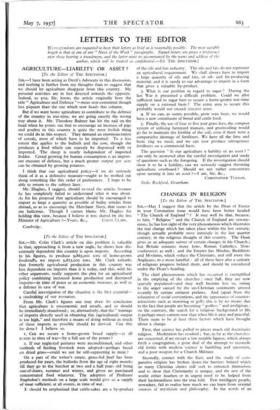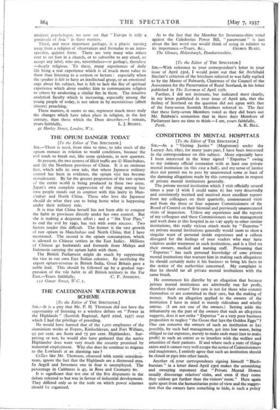SIR,—May I suggest that the article by the Dean of
Exeter in your Coronation issue would have been better headed "The Church of England " ? It may well be that, because, to him, " Religion " and the Church of England are synony- mous, he has lost sight of the very phenomenon which illustrates the real change which has taken place within the last century, though actually probably most intensely in the last quarter century, in the religious thought of this country. The Dean gives us an adequate survey of certain changes in his Church ; but Britain contains many Jews, Roman Catholics, Non- conformists as well ; and the Empire has Hindus, Buddhists and Moslems, which reduce the Christians, and still more the Anglicans, to a mere handful : all of these have also a century of religious progress behind them, and should be considered under the Dean's heading.
• The chief phenomenon which has occurred is exemplified in the emptying of the churches : once full, they are now sparsely populated—and may well become less 'so, owing to the anger caused by the un-Christian sentiments uttered recently by certain eminent prelates. And (apart from the relaxation of social conventions, and the appearance of counter- attractions such as motoring or golf) this is by no means due to the fact that people are becoming" godless "and irreligious : on the contrary, the search for a religious background to life is perhaps more current now than when life is easy and peaceful. There seem to be at least three factors which have brought about a change.
First, that science has pulled to pieces much old doctrinaire religion. Modernism has resulted ; but, as far as the churches are concerned, if we except a few notable figures, which always fetch a congregation, a great deal of the attempt to reconcile old forms with modern science is fumbling and uncertain, and a poor weapon for a Church Militant.
Secondly, contact with the East, and the study of com- parative religion has broken down the barriers behind which so many Christian clerics still seek to entrench themselves and to show that Christianity is unique, and the rest of the world either heathen or in urgent need to be helped from their backwardness into the true fold. Few intelligent people, nowadays, fail to realise how much we can learn from oriental sources of mysticism and philosophy. In the words of an
eminent psychologist, we now see that "Europe is only a. peninsula of Asia" in these matters. _ Third, and most important perhaps, is a phasic turning away from a religion of observances and formulae to an intro- spective, quietist form. There are very many who refuse ever to set foot in a church, or to subscribe to any creed, or accept any label, who are, nevertheless—or perhaps, therefore —deeply religious. To these, many experiences of daily Life bring a real experience which is of much more value to them than listening to a sermon or lecture : especially when the speaker is felt to have an intellectual grasp, or an emotional urge about his subject, but is felt to lack the fire of spiritual experience which alone enables him to communicate religion to others by awakening a similar fire in them. The intuitive analytical faculty which is increasing, especially among the young people of today, is not taken in by meretricious (albeit sincere) preaching.
These matters, it seems to me, represent much more truly the changes which have taken place in religion, in the last century, than those which the Dean describes.—I remain, yours faithfully, L. J. BENOIT. gr Harley Street, London, W.r.















































 Previous page
Previous page